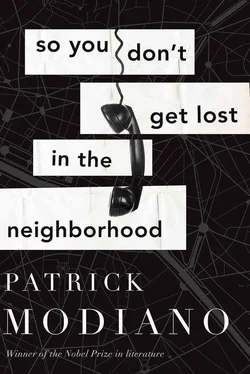“He’s coming back from Charbonnières tomorrow. . at about midday. . He’ll be pestering you again. . Whatever you do, don’t tell him we’ve seen each other.”
Daragane wondered whether she was being honest and whether she might not let Ottolini know about her visit to him that night. Unless it could have been Ottolini who had asked her to carry out this assignment. In any case, he was sure of being able to get rid of them sooner or later, as he had done with many people during the course of his life.
“In short,” he said cheerfully, “you’re a couple of criminals.”
She appeared astounded by these words. He regretted them immediately. She was hunched up and for a moment he thought she was about to dissolve into tears. He leant over towards her, but she avoided his gaze.
“All this, it’s because of Gilles. . I had nothing to do with it. .”
Then, after a moment’s hesitation:
“Be careful of him. . He’ll want to see you every day. . He won’t give you a moment’s peace. . The guy is. .”
“. . clinging?”
“Yes. Very clinging.”
And she seemed to give this term a more worrying significance than he had first intended.
“I don’t know what he has learnt about you. . Perhaps something in the dossier. . I haven’t read it. . He’ll use it as a means of putting pressure. .”
The words she had just used sounded false coming from her. It was doubtless Ottolini who had spoken to her about a “means of putting pressure”.
“He wants you to help him write a book. . That’s what he told me. .”
“Are you sure he doesn’t want anything else?”
She hesitated for a moment.
“No.”
“Perhaps ask me for money?”
“It’s possible. . Gamblers need money. . Yes, of course he’s going to ask you for money. .”
They must have discussed the matter after the meeting in rue de l’Arcade. They probably had their backs to the wall — an expression that Chantal used to employ in the past, when she spoke about Paul. But he always thought he would recover thanks to his doubling up on his losses.
“Soon, he won’t even be able to pay the rent for his room in square du Graisivaudan. .”
Yes, rents had certainly increased over forty-five years in square du Graisivaudan. Daragane occupied the room illegally, thanks to a friend to whom the owner had entrusted the keys. There was a telephone in this room, with a padlock on the dial so that no-one could use it. But he succeeded in dialling certain numbers all the same.
“I, too,” he said, “lived in square du Graisivaudan. .”
She looked at him in surprise, as if she were discovering links between them. He was on the point of adding that the girl who occasionally came to join him in this room was also called Chantal. But what was the point? She said to him:
“Well, perhaps it’s the same room that Gilles has. . An attic room. . you take the lift and then go up a small staircase. .”
Yes, that was right, the lift did not go to the top floor — a corridor with a succession of rooms along it, each with a partially faded number on the door. His was number 5. He remembered because of Paul, who often tried to explain to him one of his formulas for doubling up on his losses “around the neutral five”.
“And I had a friend who gambled at the races, and also went to the casino at Charbonnières. .”
She seemed reassured by these words and she gave him a faint smile. She must have thought that even though there were a few dozen years between them they came from the same world. But which one?
“So, you were coming back from one of your parties?”
He immediately regretted asking her the question. But she evidently felt she could trust him:
“Yes. . It’s a couple who organise rather special parties in their apartment. . Gilles worked for them for a while as chauffeur. . They used to phone me from time to time to get me to come. . It’s Gilles who wants me to go. . They pay me. . I can’t do anything else. .”
He listened to her without daring to interrupt. Perhaps her remarks were not meant for him and she had forgotten he was there. It must be very late. Five in the morning? Daybreak would soon come and would scatter the shadows. He would find himself alone in his study after a bad dream. No, he had never lost this address book. Neither Gilles Ottolini nor Joséphine Grippay who called herself Chantal had ever existed.
“It’s going to be very difficult for you, too, to get rid of Gilles now. . He won’t let you go. . I wouldn’t put it past him to wait for you at the door of your building. .”
A threat or a warning? With dreams, thought Daragane, one is never really certain what they’re to do with. A dream? All would become clear at daybreak. And yet sitting here, opposite him, there was nothing ghostly about her. He was not sure whether voices could be heard in dreams, but he could hear Chantal Grippay’s husky voice very clearly.
“I’ve got one piece of advice for you: don’t answer his phone calls anymore. .”
She was leaning towards him and speaking in a very low voice, as though Gilles Ottolini were standing behind the door.
“You must leave messages for me on my mobile. . When he’s no longer there, I’ll call you back. . I’ll keep you informed about what he’s planning to do. In that way, you’ll be able to avoid him. .”
This girl was clearly very considerate, but Daragane would have liked to explain to her that he could cope on his own. He had come across other Ottolinis in his life. He knew a great many buildings in Paris that had two entrances, and thanks to them he was able to shake people off. And so as to make people think that he had gone out, he often kept the lights switched off at home, because of the two windows that overlooked the street.
“I lent you a book and told you that Gilles had written it. . Le Flâneur hippique . .”
He had forgotten the existence of this book. He had left it in the orange cardboard folder when he took out the photocopies.
“It’s not true. . Gilles makes people think he wrote this book because its author has the same name as him. . but not the same first name. . And, what’s more, the guy’s dead. .”
She rummaged in the plastic bag that she had put down beside her on the sofa. From it, she brought out the black satin dress with two yellow swallows that Daragane had noticed in her room in rue de Charonne.
“I forgot my pair of high-heeled shoes at these people’s place. .”
“I know that dress,” Daragane said.
“Each time I go to these people’s parties, they want me to wear it.”
“Odd sort of dress. .”
“I found it at the bottom of an old cupboard in my room. . There’s a label on the back.”
She handed him the dress and on the label he read: “Silvy-Rosa. Fashion design. Rue Estelle. Marseille.”
“Perhaps you wore it in an earlier life. .”
He had said the same thing to her, yesterday afternoon, in the room in rue de Charonne.
“Do you think so?”
“A feeling. . because of the label, which is very old. .”
She in turn looked at the label suspiciously. Then she put down the dress, beside her, on the sofa.
“Wait. . I’m coming back. .”
He left the study to ascertain whether he had left the light on in the kitchen. The window there overlooked the street. Yes, he had left the light on. He switched it off and stood by the window. A moment ago, he had imagined that Ottolini was keeping watch outside. Such thoughts come to you very late, when you have not slept, thoughts that you once had long ago, as a child, that frighten you. No-one. But he could be hiding behind the fountain or, on the right, behind one of the trees in the square.
He stood there for a long time, very upright, his arms folded. He saw nobody in the street. No cars went by. Had he opened the window, he would have heard the murmur of the fountain and he would have wondered whether he was not in Rome rather than Paris. Rome, from where a long time ago he had received a postcard from Annie Astrand, the last sign of life he had had of her.
Читать дальше












